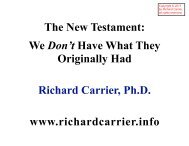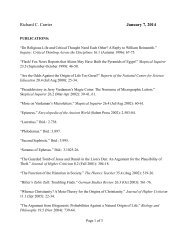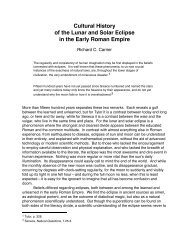“Bayes' Theorem for Beginners: Formal Logic and ... - Richard Carrier
“Bayes' Theorem for Beginners: Formal Logic and ... - Richard Carrier
“Bayes' Theorem for Beginners: Formal Logic and ... - Richard Carrier
Create successful ePaper yourself
Turn your PDF publications into a flip-book with our unique Google optimized e-Paper software.
11. The Advantages of Bayes’ <strong>Theorem</strong><br />
1. Bayes’ <strong>Theorem</strong> will help you determine how to tell if your theory is probably true<br />
rather than merely possibly true.<br />
It achieves this (a) by <strong>for</strong>cing you to compare the relative likelihood of different<br />
theories of the same evidence (so you must think of other reasons the evidence we have<br />
might exist, besides the reason you intuitively think is most likely), <strong>and</strong> (b) by <strong>for</strong>cing<br />
you to examine what exactly you mean when you say something is ‘likely’ or ‘unlikely’<br />
or is ‘more likely’ or ‘less likely’. With Bayes’ <strong>Theorem</strong> you have to think in terms of<br />
relative probabilities, as in fact must be done in all sound historical reasoning, which<br />
ultimately requires matching numbers (or ranges of numbers) to your vocabulary of<br />
likelihood.<br />
2. Bayes’ <strong>Theorem</strong> will inspire a closer examination of your background knowledge,<br />
<strong>and</strong> of the corresponding objectivity of your estimates of prior probability.<br />
Whether you are aware of it or not, all your thinking relies on estimations of prior<br />
probability. Making these estimations explicit will expose them to closer examination <strong>and</strong><br />
test. Whenever you say some claim is implausible or unlikely because ‘that’s not how<br />
things were done then’, or ‘that’s not how people would likely behave’, or ‘other things<br />
happened more often instead’, you are making estimates of the prior probability of what<br />
is being claimed. And when you make this reasoning explicit, unexpected discoveries can<br />
be made.<br />
For example, as Porter <strong>and</strong> Thiessen have both observed, it’s inherently unlikely<br />
that any Christian author would include anything embarrassing in a written account of his<br />
beliefs, since he could choose to include or omit whatever he wanted. In contrast, it’s<br />
inherently likely that anything a Christian author included in his account, he did so <strong>for</strong> a<br />
deliberate reason, to accomplish something he wanted to accomplish, since that’s how all<br />
authors behave, especially those with a specific aim of persuasion or communication of<br />
approved views. There<strong>for</strong>e, already the prior probability that a seemingly embarrassing<br />
detail in a Christian text is in there because it is true is low, whereas the prior probability<br />
that it is in there <strong>for</strong> a specific reason regardless of its truth is high.<br />
3. Bayes’ <strong>Theorem</strong> will <strong>for</strong>ce you to examine the likelihood of the evidence on<br />
competing theories, rather than only one—in other words, <strong>for</strong>cing you to consider<br />
what the evidence should look like if your theory happens to be false (What evidence can<br />
you then expect there to be? How would the evidence in fact be different?). Many<br />
common logical errors are thus avoided. You may realize the evidence is just as likely on<br />
some alternative theory, or that the likelihood in either case is not sufficiently different to<br />
justify a secure conclusion.<br />
For example, Paul refers to James the Pillar as the Brother of the Lord, <strong>and</strong> to the<br />
Brothers of the Lord as a general category of authority besides the Apostles. It is assumed<br />
this confirms the historicity of Jesus. But which is more likely, that a historical (hence<br />
biological) brother of Jesus would be called the Brother of the Lord, or that he would be<br />
called the Brother of Jesus? In contrast, if we theorize that ‘Brother of the Lord’ is a rank<br />
in the Church, not a biological status, then the probability that we would hear of<br />
18








